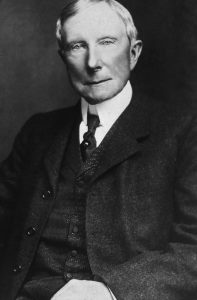Learning From One of the Best
Wednesday, July 25, 2018 - Joe Kiedinger
Rockefeller, the famous American man of industry established habits for growing a company to extreme abundance. Verne Harnish, in his book, Mastering the Rockefeller Habits, outlines Rockefeller’s simple process which is outlined below from Harnish’s findings:
• Priorities: Does the company have 3-5 top priorities for the year, each quarter and a clear #1 top priority? Does everyone in the company have their own priorities, aligned with these? Priorities matter because you’ll make faster progress by focusing everyone’s energies on one area.
• Data: Does the company have sufficient feedback on a daily and weekly basis about the progress of said objectives?
• Rhythm: Does the company have an effective pattern of well-organized daily, weekly, monthly, quarterly and annual meetings to maintain alignment and drive accountability?
The missing element to Rockefeller’s process in the new millennium:
Rockefeller provides a simple and relevant process for his time. However, expectations have changed. It’s not enough to simply set strategy, have data and hold regular meeting rhythms. Employees need more. 
Toyota taught its industry that when you engage your employees on a more meaningful level, profits really soar. Over the last several decades, leadership movements like Servant Leadership (introduced by Robert Greenleaf, GE executive, in the 70’s) were emerging. The Servant Leadership management style believes leaders must be strict, but fair, celebrate employees’ small wins and treat each person as unique. Another movement born from similar principles was LEAN Leadership.
Other great companies emerged that built empires on these new foundational principles: Southwest Airlines, Men’s Warehouse (in the George Zimmer years) and Zappos—to name a few. A whole new awareness of human dignity began to rise in the workplace at an unparalleled rate.
Employees now know the difference of being told what to do versus being involved in the process. Social media has brought this dignity concept out in the open. Today, social media platforms like Glassdoor allow job candidates to hear from other employees about what it’s like to work at an organization before even applying.
Talented people expect much more from their employer than they did in Rockefeller’s day. They want vision, mission, core values, and a sense that what they are doing matters. In other words, they want a purpose for coming to work every day.
Through it all is a new awareness of human dignity at the centerpiece of highly successful organizations. Connecting each employee’s dignity to their role in an organization, while also providing vision, goals and clear objectives—as Rockefeller taught— completes the circle of high-growth companies.
So I ask you, is your structure set up for success? Do you have systems to engage your people and meet your objectives? It’s this intersection of hard and soft skills that are critical in today’s marketplace.
Joe Kiedinger
ACTION PLAN: If you are looking to improve in these critical areas, Prophit can help. It’s what we do. And, we love seeing people win!

